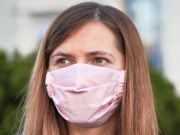
If you toss and turn every night because the coronavirus epidemic has left you anxious and worried, one sleep expert has some advice. Financial struggles, loss of control, or worries about loved ones can affect peoples’ quality and duration of nightly sleep, said sleep psychologist Emerson Wickwire, an associate professor of psychiatry and medicine at… read on >





























